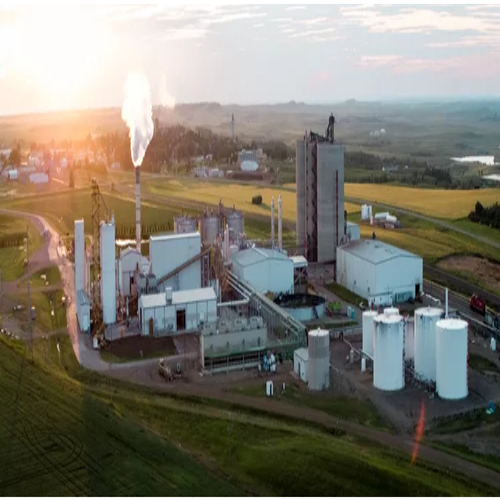Red Trail Energy becomes first ethanol plant to join a voluntary carbon market

While controversy continues to surround the carbon capture and sequestration (CCS) pipeline projects many ethanol companies are banking on, some plants may be able to take CCS into their own hands.
That is exactly what is happening at Red Trail Energy (RTE), a 64 million-gallon-per-year corn ethanol plant in Richardton, North Dakota. The plant’s decision to join a voluntary carbon market has been key. Earlier this week the company announced it is the first ethanol plant in the world to do so.
“This program strengthens our position in the ethanol industry and sets a new standard for sustainability and innovation, driving positive change and demonstrating the viability of proactive environmental stewardship within our industry,” says Jodi Johnson, CEO of RTE.
How it works
The plant sits atop the Broom Creek formation, which contains the geology needed for carbon storage. RTE is capturing and storing CO2 produced in the ethanol fermentation process in a well approximately 6,500 feet below the plant. The company says it has sequestered more than 247,000 tons of CO2 since June 2022.
One ton of CO2 sequestered by RTE can generate one credit, called a CO2 removal certificate or CORC for short. CORCs will be available for purchase by companies looking to offset their carbon emissions.
RTE worked with clean energy advisory firm EcoEngineers to register the project under the Puro Standard. According to Puro.earth, the Puro Standard is the world’s leading crediting platform for engineered carbon removal. Prior to the issuance of credits, RTE passed an independent verification to meet all requirements of feedstock sustainability, carbon sequestration permanence, and financial additionality.
Through the Puro.earth registry, RTE was issued more than 150,000 CORCs from the first 14 months of project operation. Puro.earth-issued CORCs represent 1,000-plus years of carbon sequestration durability, which meets the criteria for permanence.
“This is the largest durable carbon removal credit issuance to date in the VCM [voluntary carbon market], marking a monumental milestone toward scaling CDR [carbon dioxide removal] to climate-relevant levels,” says Antti Vihavainen, CEO of Puro.earth. “The significance of RTE’s CCS project cannot be overstated, as it serves as a compelling demonstration that through stringent methodologies for carbon removal and the financial incentives from CORCs, the vital infrastructure required for large-scale carbon sequestration will materialize.”
Blazing a trail
RTE may be first ethanol plant to join a voluntary carbon market but Shashi Menon, CEO of EcoEngineers, says he hopes more ethanol plants will pursue it.
“I think just about every ethanol plant in the country is considering carbon sequestration,” says Menon. “RTE and Puro have demonstrated to all the other ethanol plants that this can be done…. And we really hope a lot of other ethanol plants follow this route.”
Puro.earth’s requirement of additionality essentially boils down to this: ability to sell into the carbon market must be essential to making the CCS project financially viable. Johnsons says the plant originally pursued CCS to lower their carbon intensity and sell into low carbon fuel markets. However, entering those markets and seeing a return on investment proved a longer and more challenging process than anticipated, making the voluntary carbon market vital to the project’s success.
She says other ethanol plants, even those hoping to sequester via a pipeline, may still find in the early years of their investment a voluntary carbon market could help them.
“I can’t speak for them directly, but the capture equipment is a big portion of the expense that we incurred, so I believe they’re going to have a fair amount of expense into the project as well,” she says.
David LaGreca, managing director of voluntary carbon market services at EcoEngineers, says each project will have to do its own assessment to determine if they qualify for a voluntary carbon market and who qualifies may change over time as the market changes.
He says at some point CCS will become a common enough practice for enough ethanol plants in the U.S. and globally that carbon credits will become unnecessary. “That’s certainly not the case today, and that’s why these programs exist. It really incentivizes these new innovative project types.”
Johnson says her best advice for plants considering a CCS project is not to limit yourself to one idea.
“Definitely begin the process right away of diversifying and going into those different programs,” she says.
Source Link: https://www.agriculture.com/red-trail-energy-becomes-world-s-first-ethanol-plant-to-join-a-voluntary-carbon-market-8605135
















